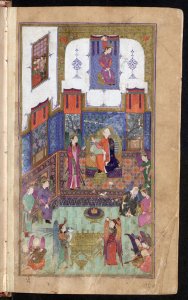Presented By: History of Art
David Baysunghur’s Model Books: Making Manuscripts in Early Fifteenth-Century Herat

Timurid prince Baysunghur (d. 1433), son of Shahrukh, grandson of Timur, has long been recognized as both generous patron and accomplished practitioner of art and literature. The effects of a rich corpus of written sources in Persian and the objects made for him—a personal library of finely made manuscripts—have led scholars to attribute to him creative agency and aesthetic adjudication. While the lecture questions this formulation, its chief concern is to reconsider the achievements of artists in the Herat workshop (kitabkhana) and the new kinds of books that they made. Baysunghur’s books were not only marked by technical accomplishment and formal coherence across media but by the studied emulation of selected artistic traditions throughout Greater Iran. The lecture gauges the implications and effects of these choices upon the beholder.
David J. Roxburgh is Prince Alwaleed Bin Talal Professor of Islamic Art History at Harvard University where he has taught since he received the Ph.D. from University of Pennsylvania in 1996. In his publications, Roxburgh has pursued several interests—including aesthetics and the history of reception—and approaches to the study of art history.
David J. Roxburgh is Prince Alwaleed Bin Talal Professor of Islamic Art History at Harvard University where he has taught since he received the Ph.D. from University of Pennsylvania in 1996. In his publications, Roxburgh has pursued several interests—including aesthetics and the history of reception—and approaches to the study of art history.